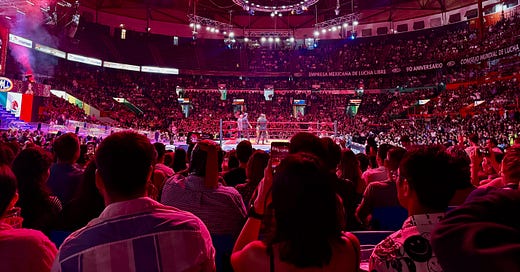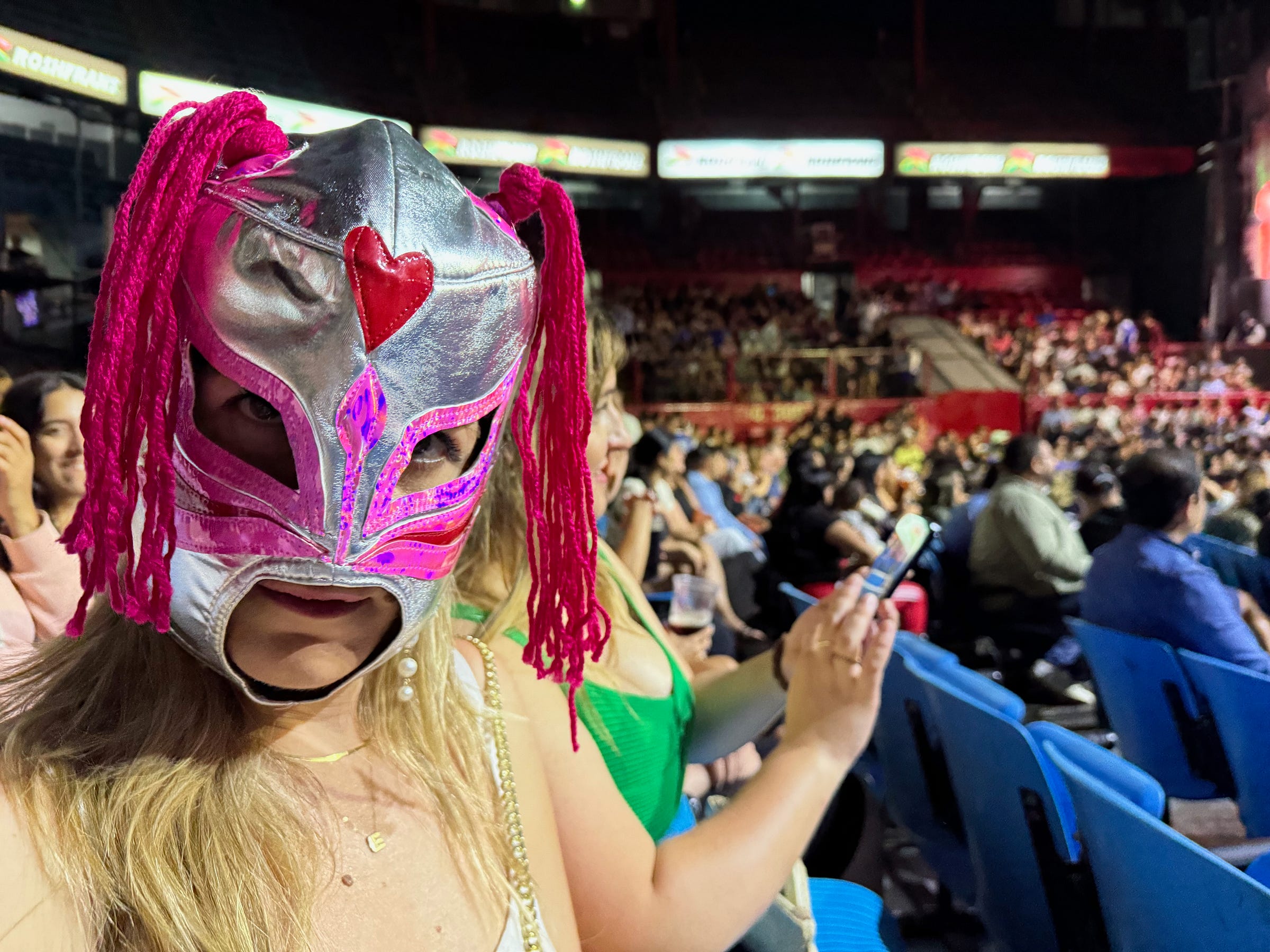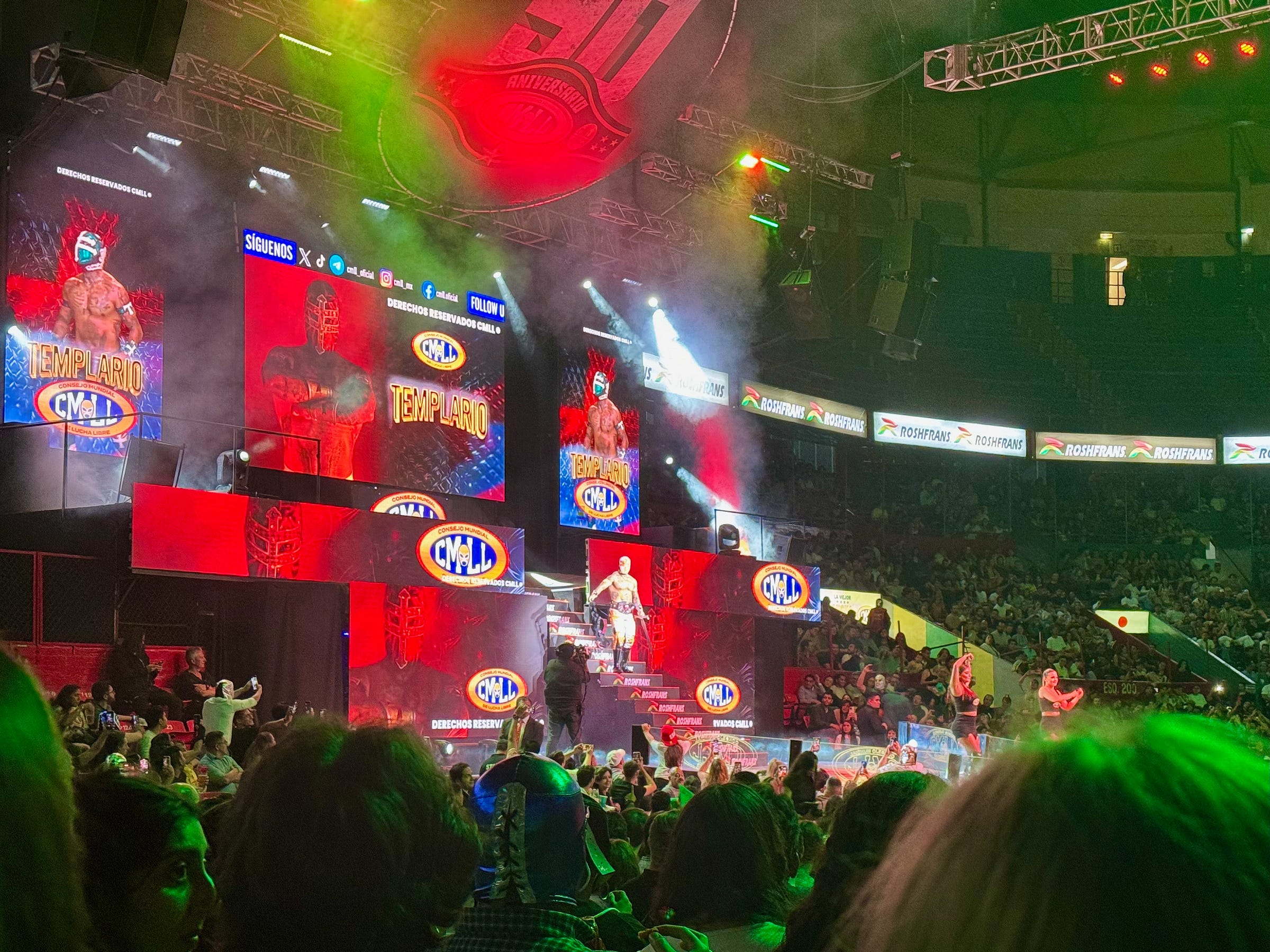If you had told me six months ago that one day I’d find myself screaming for masked wrestlers in velvet leggings and bedazzled spandex, I’d have snorted. But you don’t question the bride at a bachelorette party, so when my college best friend invited me and eleven others to Mexico City for the weekend and directed us to don our most obnoxious neon outfits for a Lucha Libre show, I did as I was told. It was a Friday night, and a sweaty horde of revelers was backed all the way onto the street outside the Aréna Mexico—cabbies honking, hawkers selling tchotchkes. My friends and I elbowed through it to claim our seats.
Inside, the arena was not unlike a Southern Baptist megachurch, down to the heat and humidity. It had been an unseasonably torrid day, and the hard folding chairs stuck my viscose dress to my back and thighs until I’d soaked it through. A large congregation had already gathered to listen to the announcer’s sermon in rapid-fire Spanish, which I tried unsuccessfully to decipher as it roared through dozens of speakers hanging from the ceiling.
Whatever he was saying, he was saying it with panache to match the spectacle in the ring. Two teams of three wrestlers each—one side dressed as red devils, the other in gray and black demon costumes that fully covered their heads and faces—were pummeling each other. Given the distance, it took me about ninety seconds to realize that all six of them were little people, ever so tastefully called the “Mini-Estrellas,” or miniature stars. A salvo of strobe lights battered my retinas. I wheeze-laughed as I snapped photos of the bride in her plasticky veil and silver Lucha mask (complete with hot pink pigtails), sticking her tongue out and doing the “rock ‘n’ roll” salute.
To an outsider like me, the whole show looked like nothing more than a glitzier, campier version of WWE wrestling. The crystals, lace-up boots and tight lamé briefs were giving Liberace meets the Power Rangers. I had assumed Lucha Libre was the sort of trap that only the least worldly of tourists would spend any time on (and I, of course, am the worldliest of all!), but a quick look around told me I’d been mistaken. We were surrounded by locals, whose casual tee-shirts and button downs—in contrast to the traffic cone getups my friends and I were wearing—said that this was just their average Friday. Their faces were rapt as the announcer interviewed the velour-clad women about to take to the mat.
I would later learn that the promoter for that night’s show, the Consejo Mundial de Lucha Libre (CMLL), had been active since 1933, making it the world’s oldest continuously operating wrestling organization. This was no tourist trap designed for drunken bachelorette parties. Lucha Libre’s roots ran deep in Mexican culture, as evidenced by the emotional investment of the ten local men in the row behind us. One in particular was screaming obscenities like chinga su madre, chinga su PUTA MADRE at the top of his lungs as the lady wrestlers began hurling themselves at each other, and I wondered if he kissed his madre with that mouth.
My friends’ questions were more germane. “How can people care so much about this when it’s clearly fake?” one shouted above the din. Indeed, the fighting looked about as real as a Gucci bag purchased from AliExpress. The body slams stopped a hair too short; the falls were suspiciously soundless. This was less of a wrestling match and more of a glorified soap opera. But Lucha Libre isn’t about the fights—it’s about the fighters. Their enemies, their dramas, their rags-to-ring backstories. Luchadores wear masks in the ring to obscure their true identities, each taking on a persona that can last the wrestler’s (actor’s?) entire career. Some characters are villains while others become folk heroes. You root for the good guy and you boo for the bad guy, because things are black and white in soap opera land. The plots are straightforward and easy to understand, approximating the human experience with none of the mess or ambiguity or nuance so you know exactly what to feel and how to respond. It’s all a bit absurd and ridiculous, but our lives are a bit absurd and ridiculous; the falseness of the story is what makes it true.
In any case, I was having too amazing a time to care about realism in the moment—maybe it was the heat making me delirious, or the beer of questionable provenance that had just appeared in my hand—and the headline match was finally starting. Eight wrestlers swaggered out from backstage, one at a time, each to his own walkup music and a light show and shimmies from the ring girls. There was Felino, Mephisto, Dark Panther, El Hijo De Villano, some guy wearing fairy wings (which seemed like a hindrance, but what do I know).
Being new to the Lucha universe, I had no loyalties to any of them—until the final wrestler walked out.
Místico.
Místico was the unequivocal favorite. I felt it viscerally. He was resplendent in white accented with gold. An electric current began to hum through the audience when he stepped out from backstage, and it was as though we had all become part of the same power line, a river of pure energy. I joined the crowd in cheering his name—Místico! Místico!—our collective hearts swelling and thumping as one.
Then the bell sounded and the scrum began, each fighter picking a fight with whoever was closest. One tapped out; another was faux-slammed into the hard ground outside the ring, strapped to a gurney, and rushed out by “medics.” The men behind us got even louder than before. Pendejo, culero, PINCHE CULERO! This was emotional. This was personal.
The numbers in the ring dwindled quickly as victors emerged from the initial pairings, and suddenly it was down to the final few. Místico was still in. The crowd’s hunger for his victory was palpable. He had to win. We needed him to win.
Then, when the referee wasn’t looking, Ángel de Oro kicked Místico in the groin—a blatant foul—and Místico went down. The crowd gasped and fell into an impotent silence, a balloon that had suddenly popped and deflated. It dawned on us that Ángel had won. We burst into outrage. Nada nada nada! came a shout from behind us. Upset fans started filing out of the arena in protest. My friends and I filed out, too, booing with the rest of them.
That concluded my brief stint as a Lucha fan, but I had no doubt Místico would be back in the ring the following Friday, looking for a comeback. Our fellow spectators would be back, too, because they needed a better ending, not just for Místico, but for themselves. We are all the Místicos of our own stories, and the world knocks all of us down sometimes; the splendid hero in spandex loses to an ignoble cheater in different colored spandex. But as long as Místico keeps dusting himself off and fighting for that title belt, there is a chance he can be redeemed. That we can be redeemed, if we have the courage to do the same.
This is why people care about Lucha Libre, and what makes it real in spite of all its phoniness. Embedded in the plot is a sacred text that tells us how to pick ourselves up when the world knees us in the crotch. Underneath all the glitter and the theatrical lighting, the arena is a church, and the story is scripture.
It teaches us to fight on.
In case you missed it:
I took last week off for the 4th of July. The week prior, I released a lyric essay about visiting Japan’s Miyajima Island and being spooked by a mountain spirit.
Up next:
A new essay for paid subscribers will be out next week—please upgrade below if you’d like to follow along.









Excellent piece, with such a well crafted ending!
You are living a BIG life Sam, Brava! ✨